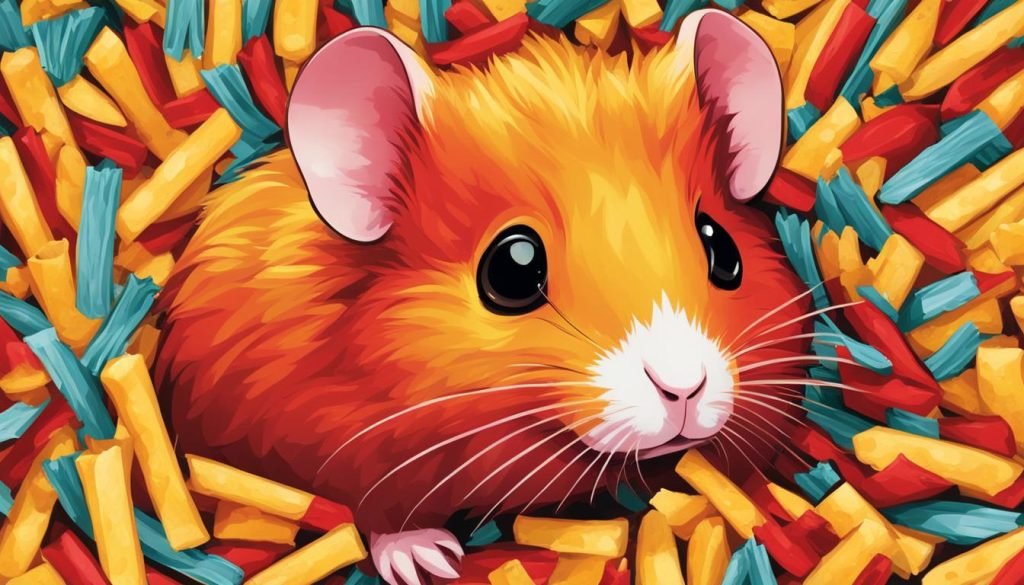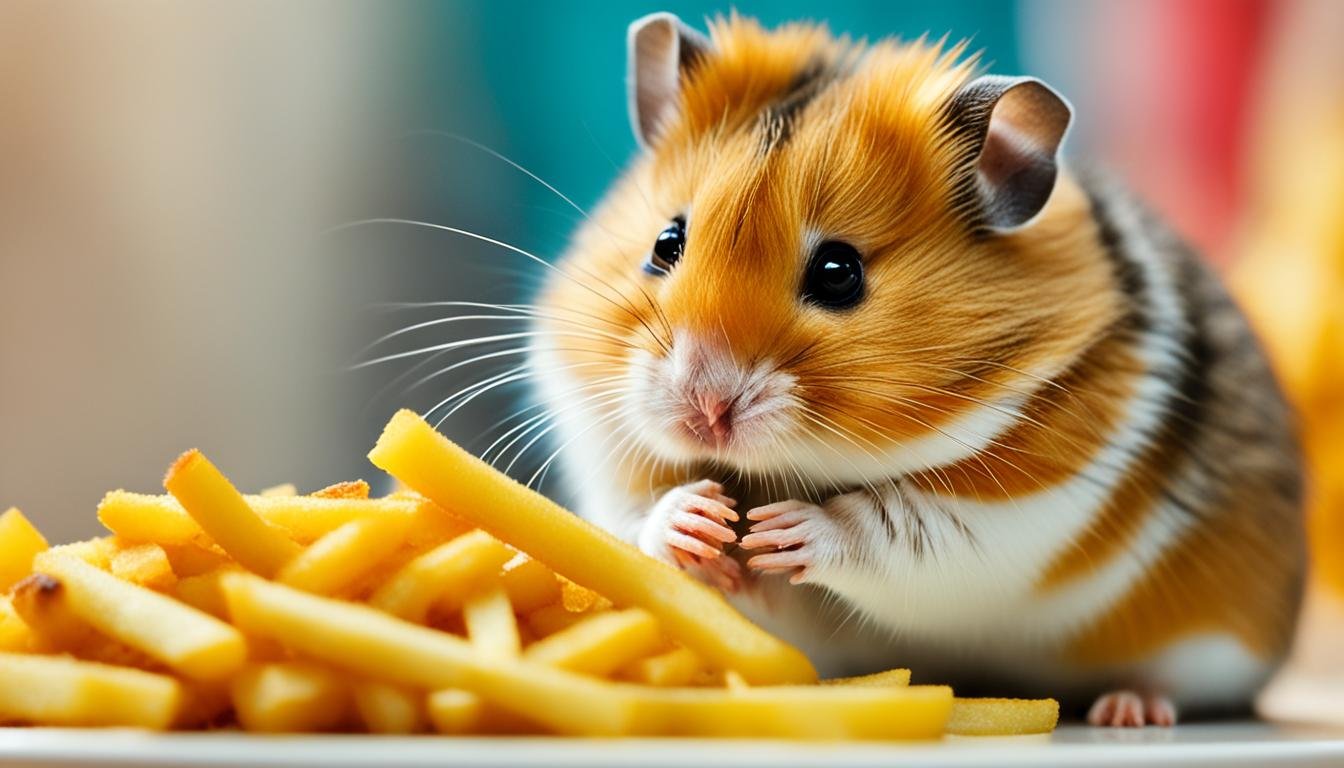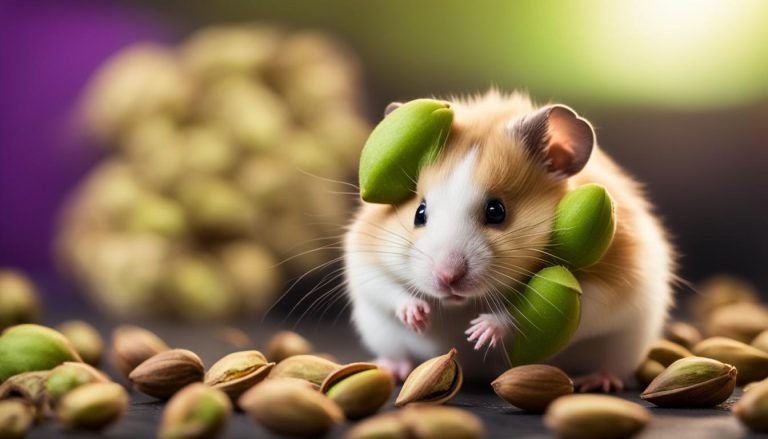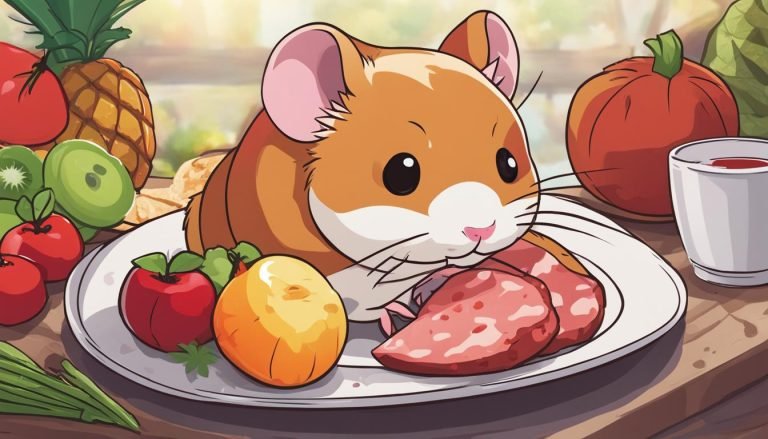Can Hamsters Eat French Fries? Find Out Here!
As a hamster owner, you may wonder what foods are safe and healthy for your furry friend. One common question that often arises is whether hamsters can eat french fries.
In this article, I will address this concern and provide you with valuable information about the ideal hamster diet, suitable vegetables for hamsters, and the dos and don’ts of feeding hamsters.
Key Takeaways:
- French fries are not safe for hamsters to eat due to their high content of unhealthy fats, oils, salt, and additives.
- Hamsters have a smaller digestive system than humans, making it difficult for them to process these ingredients.
- Feeding french fries to hamsters can lead to digestive issues, obesity, heart problems, and allergies.
- Hamsters can eat cooked or boiled potatoes in small amounts, but raw potatoes are harmful due to the toxin solanine.
- The ideal hamster diet consists of fresh fruits, vegetables, grains, and hay, providing the necessary proteins, fats, and fiber.
Can Hamsters Eat French Fries?
French fries may be a delicious treat for humans, but they are harmful to our furry friends, the hamsters. These crispy indulgences are high in unhealthy fats, oils, salt, and additives, making them a dangerous choice for hamsters.
The high-fat content in french fries can lead to digestive issues, obesity, and even heart problems in hamsters. Their small size and delicate digestive systems are ill-equipped to handle the excessive fat, salt, and additives found in fries, causing potential health risks.
Furthermore, hamsters are prone to food allergies, and the additives present in french fries can trigger severe allergic reactions. These reactions can range from skin irritations to respiratory difficulties, jeopardizing their overall well-being.
It’s essential to provide our hamster companions with a balanced and nutritious diet to ensure their happiness and longevity. Instead of feeding them french fries, opt for healthier options such as fresh fruits, vegetables, and high-quality hamster-specific food. These alternatives provide the necessary nutrients while minimizing the risks associated with unhealthy treats.
To summarize, french fries are not suitable for hamsters due to their high fat, salt, and additive content. These ingredients can lead to digestive issues, obesity, heart problems, and allergic reactions. As responsible pet owners, it is our duty to prioritize the health and well-being of our furry companions by offering them a diet that meets their nutritional needs and avoids potential dangers.
What Kind of Health Issues May Arise from French Fry Intake?

Feeding french fries to hamsters can result in various health issues that should be carefully considered. While it may seem harmless to share a few fries with our furry friends, these tasty treats can actually pose significant risks to their well-being.
Digestive Problems
The high salt and fat content found in french fries can disrupt a hamster’s delicate digestive system. Hamsters have a smaller digestive system compared to humans, making it difficult for them to process large amounts of unhealthy fats and salts. Consuming french fries can lead to diarrhea and other digestive issues, causing distress and discomfort for your beloved pet.
Obesity and Heart Problems
Another concern associated with feeding hamsters french fries is the risk of obesity and heart problems. French fries are high in unhealthy fats and oils, which can contribute to weight gain in hamsters. Being overweight can put additional strain on their hearts, increasing the risk of cardiovascular issues and reducing their overall quality of life.
Allergic Reactions
French fries often contain additives and preservatives that can trigger allergic reactions in some hamsters. These reactions can range from mild discomforts, such as itching or sneezing, to more severe symptoms like difficulty breathing or anaphylaxis. It is important to note that individual hamsters may have different sensitivities to the ingredients found in french fries.
Given the potential health risks associated with french fry consumption, it is best to avoid giving them to your hamster altogether. Instead, focus on providing a balanced and nutritious diet that includes suitable fruits, vegetables, and grains. By prioritizing your hamster’s well-being, you can help them live a long, healthy, and happy life.
Can Hamsters Eat Potatoes?
When it comes to feeding your hamster, you might be wondering if potatoes are a suitable option. The answer is yes, but with some caution and moderation.
I’m sure you’re familiar with the toxin called solanine, which is found in raw potatoes. Thankfully, cooking or boiling potatoes removes this harmful substance, making them safe for hamster consumption. So, before giving potatoes to your furry friend, always ensure they are properly cooked.
While potatoes are safe for your hamster, it’s important to avoid adding any seasonings, butter, or salt. These added flavors and ingredients can be harmful to their sensitive digestive system. Keep it simple and plain when it comes to serving potatoes to your hamster.
Remember, moderation is key. Incorporating small amounts of potatoes into your hamster’s diet can be beneficial, but feeding them too much can lead to digestive issues. It’s also essential to balance their potato intake with other foods to ensure they get a well-rounded diet.
By following these guidelines, you can safely include potatoes in your hamster’s diet. Just remember to cook them without any added seasonings, serve them in moderation, and accompany them with other safe foods for balanced nutrition.
What Is the Ideal Hamster Diet?
When it comes to the diet of your beloved hamster, providing them with the right foods is essential for their health and well-being. The ideal hamster diet consists of a variety of fresh fruits, vegetables, grains, and hay. These foods ensure that your hamster receives the necessary nutrients for their growth, energy, and overall vitality.
Hamsters require proteins, fats, and fiber in their diet to maintain a balanced nutrition. High-quality hamster food pellets can serve as a staple base for their diet, providing them with the necessary nutrients. However, it’s important to supplement their diet with a variety of fresh foods to ensure they receive a well-rounded meal plan.
When choosing fruits and vegetables for your hamster, opt for options that are safe and beneficial for their health. Some examples of suitable fruits include apples, pears, strawberries, and blueberries. Vegetables like carrots, broccoli, spinach, and cucumbers are also excellent choices. These fresh foods provide essential vitamins, minerals, and antioxidants that contribute to their overall well-being.
Grains and hay should also be included in your hamster’s diet. Foods such as oats, whole wheat pasta, and brown rice can offer a good source of carbohydrates and energy. Timothy hay or orchard grass hay is essential for their dental health and provides the necessary fiber for their digestion.
It’s important to note that processed and unhealthy foods should be avoided in any hamster’s diet, including french fries. These foods are high in unhealthy fats, oils, and salt, which can lead to various health issues for your pet.
Hamster Diet Dos and Don’ts:
- To provide a balanced mix of fresh fruits, vegetables, grains, and hay.
- Do offer hamster food pellets as a staple base for their diet.
- Do introduce new foods gradually and monitor their reactions to ensure they are well-tolerated.
- Do provide clean fresh water at all times.
- Don’t feed your hamster processed or unhealthy foods like french fries.
- Don’t give your hamster foods that are toxic to them, such as chocolate, onions, garlic, or avocado.
- Don’t overfeed your hamster, as obesity can lead to health problems.
- Don’t forget to clean their food dishes regularly to prevent bacterial growth.
Overall, providing your hamster with a well-rounded and nutritious diet is crucial for their overall health and happiness. By following these hamster diet dos and don’ts and incorporating fresh foods into their meals, you’ll ensure that your furry friend thrives and enjoys a long, healthy life.
Final Thoughts
In conclusion, it is not recommended to feed french fries to hamsters due to their unhealthy ingredients. French fries are high in fats, oils, salt, and additives, which can have detrimental effects on a hamster’s health. These ingredients can lead to digestive issues, obesity, heart problems, and allergies.
However, cooked potatoes without added seasonings can be given to hamsters in small amounts. It is important to ensure that the potatoes are thoroughly cooked to eliminate any toxins. Feeding hamsters a balanced and nutritious diet is crucial for their well-being.
The ideal hamster diet should consist of fresh fruits, vegetables, grains, and hay. These provide essential nutrients such as vitamins, minerals, and fiber for their overall health. It is important to offer a variety of foods and monitor their reactions to new foods to ensure their dietary needs are met.
By prioritizing their dietary needs and avoiding harmful foods like french fries, you can help your hamster live a healthy and happy life.
Similar Posts:
- Can Hamsters Eat Cranberries? Safe Treat Tips
- Can Hamsters Eat Bell Peppers? Safe Feeding Tips
- Can Hamsters Eat Radish? Safe Pet Snacks Guide
- Can Hamsters Eat Pecans? Nut Safety Guide
- Can Hamsters Eat Kiwi? Nutritional Facts Guide
- Can Hamsters Eat Brussels Sprouts: Safe or Not?
- Can Hamsters Eat Rice? Safe Pet Feeding Tips
- Can Hamsters Eat Potatoes? Safe Snacks Explained
- Can Hamsters Eat Pistachios? Safe Snacks Guide
- Can Hamsters Eat Mushrooms? Safety Guide
- Can Hamsters Eat Mealworms? Safe Snack Guide
- Can Hamsters Eat Crackers? Safe Snack Tips.
- Can Hamsters Eat Asparagus? Safe Feeding Guide







